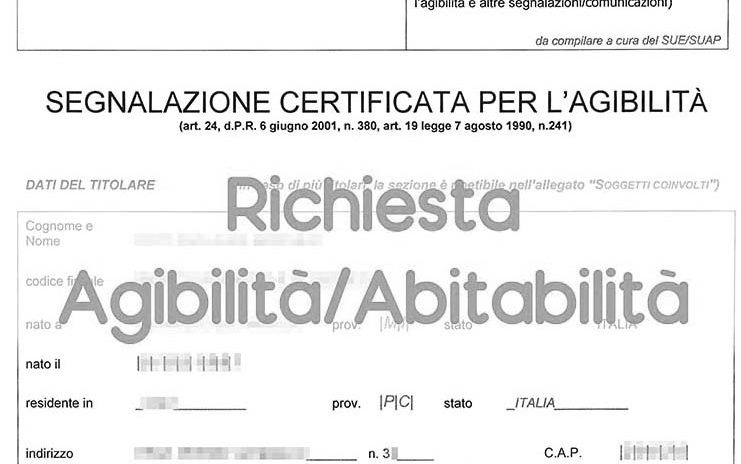GLI EFFETTI DELLA MANCANZA DEL CERTIFICATO DI AGIBILITA’ SULLA TRASFERIBILITA’ E LA LOCAZIONE DI UN IMMOBILE
THE EFFECTS OF THE LACK OF THE CERTIFICATE OF USABILITY ON THE TRANSFERABILITY AND LEASE OF A PROPERTY
- 29 Nov 2020

La Certificazione di Agibilità (comunemente detta anche “abitabilità”), sostituita dal 2016 con la Segnalazione certificata di agibilità, attesta che le caratteristiche di un determinato immobile sono tali da renderlo idoneo all’uso che per esso è stato dichiarato. Questo accertamento, che agli inizi dell’istituto riguardava quasi esclusivamente aspetti relativi alla salute e alla sicurezza delle persone, riguarda, dal 2001, anche la regolarità edilizio-urbanistica.
A seguito delle modifiche introdotte dal D.Lgs. 222/2016 al Testo unico dell’edilizia di cui al D.P.R. 380/2001, il rilascio del certificato di agibilità da parte dell’Amministrazione è stato sostituito, per un immobile di nuova costruzione, dalla presentazione da parte dell’interessato della Segnalazione certificata di agibilità (SCAG), corredata da asseverazione redatta da un Tecnico abilitato.
Vediamo cosa può accedere se l’agibilità risulta mancante:
NEL CASO DELLA COMPRAVENDITA
Con riferimento ad una compravendita immobiliare, il venditore è tenuto a consegnare i documenti che attestano l’agibilità in quanto essi sono tra quei “titoli e documenti relativi alla proprietà e all’uso della cosa venduta” che egli deve, specie se richiesti, consegnare al compratore ai sensi di C.C. art. 1477, comma 3 (C. Cass. civ. 08/02/2016, n. 2438). In particolare, il venditore, tenuto conto che l’agibilità si ottiene, dopo l’art. 3 del D.Lgs. 222/2016, tramite Segnalazione certificata, deve consegnare copia della stessa al compratore. Ove l’immobile sia stato realizzato in precedenza, quando l’agibilità si conseguiva, di regola, tramite silenzio-assenso sulla relativa domanda (art. 25, D.P.R. 380/2001), il venditore deve:
- o provare di avere fatto richiesta del certificato con la dichiarazione che, nel frattempo, non è intervenuto alcun atto di diniego né di impedimento al rilascio del certificato stesso;
- o consegnare il certificato di agibilità – già abitabilità – (C. Cass. civ. 15/02/2008, n. 3851; C. Cass. civ. 26/04/2007, n. 9976; C. Cass. civ. 18/09/2003, n. 13767; C. Cass. civ. 22/09/2000, n. 12556).
L’onere di consegnare, specie se richiesta, copia della segnalazione certificata di agibilità (o in precedenza il certificato di agibilità, o la richiesta di rilascio del medesimo) sussiste a prescindere dalla circostanza che l’immobile sia venduto per uso abitativo o commerciale.
Se l’agibilità NON è ottenibile per la mancanza dei necessari requisiti da parte dell’immobile
La mancanza del certificato stesso e la contemporanea insussistenza delle condizioni necessarie per ottenerlo, in dipendenza della presenza di insanabili violazioni delle norme urbanistico-edilizie, si traduce nella mancanza di un requisito essenziale che integra l’ipotesi di consegna di aliud pro alio (v. C. Cass. civ. 27/07/2006, n. 17140; C. Cass. civ. 26/01/2006, n. 1514, C. Cass civ, 05/06/2020 N. 10665), ossia:
- se riguarda l’intero immobile: determina la possibilità della risoluzione del contratto (C. Cass. civ. 14/11/2002, n. 16024) o del risarcimento del danno (C. Cass. civ. 20/04/2006, n. 9253) in relazione alle difficoltà nella commercializzazione che derivano dall’inagibilità dello stesso (C. Cass. civ. 23/01/2009, n. 1701), o in relazione alle spese rese necessarie per rendere agibile l’immobile (cfr. C. Cass. civ. 30/01/2017, n. 2294), nonché possibilità da parte del compratore che si veda chiedere il saldo del prezzo di eccepire l’inadempimento del venditore (cfr. Cass. n. 2294, cit.), salvo specifiche pattuizioni tra le parti.
- se riguarda parti di esso: dipende dall’importanza e della gravità dell’inadempimento in relazione alle concrete esigenze del compratore di utilizzazione diretta o indiretta dell’immobile e può portare alla risoluzione del contatto ed al risarcimento del danno (cfr. C. Cass. civ. 15/02/2008, n. 3851 che al proposito cita anche C. Cass. civ. 27/07/2006, n. 17140; C. Cass. civ. 22/11/2006, n. 24786).
Se l’agibilità è ottenibile
E’ possibile richiedere un risarcimento dei danni (C. Cass. civ. 11/10/2013, n. 23157) patiti dal compratore di immobile privo di certificato di agibilità a condizione che questi siano dedotti e provati. C. Cass. civ. 18/03/2010, n. 6548 esclude tuttavia il risarcimento di danni se l’agibilità è stata comunque, sia pure tardivamente conseguita (v. anche C. Cass. civ. 15/02/2008, n. 3851); in alcune occasioni il venditore è stato condannato a risarcire le spese sostenute dall’acquirente per conseguire il certificato eseguendo i lavori a tal fine necessari.
Se è in corso di conseguimento al momento della stipula
Si tratta di una lieve irregolarità che non determina conseguenze se, in seguito, è conseguita l’agibilità.
Se si è formato silenzio-assenso prima della stipula (situazioni anteriori al D. Leg.vo 222/2016)
Non si ravvisano profili di invalidità.
In nessuno dei casi sopraesposti il contratto di compravendita dell’immobile privo del certificato è nullo (anche se, come si è visto, nei casi estremi può essere soggetto a risoluzione). Tuttavia il notaio, tenuto ad assicurare utilmente gli effetti del negozio che è stato chiamato a stipulare e a cui è vietato formare atti invalidi, potrebbe rifiutare di stipulare un atto di compravendita immobiliare qualora manchi il certificato agibilità (cfr. C. Cass. civ. 23/03/1978, n. 1426).
NEL CASO DELLA LOCAZIONE
Salvo patto contrario, grava sul locatore l’onere di ottenere il certificato di agibilità qualunque sia la destinazione d’uso dell’immobile locato. Sul conduttore grava l’onere di ottenere le certificazioni o autorizzazioni che riguardano l’attività che egli intende svolgere nei locali locati (C. Cass. civ. 11/04/2006, n. 8409; vedi anche C. Stato 28/05/2009, n. 3262; C. Stato 19/09/2007, n. 4880). Tuttavia l’assenza della agibilità non impedisce né rende nullo il contratto di locazione ma determina una situazione di inadempimento, in ragione dell’inettitudine della cosa a soddisfare l’interesse del conduttore che espone il locatore, solo in caso di definitivo diniego del rilascio del relativo certificato a subire la risoluzione del contratto e la richiesta di risarcimento del danno (C. Cass. civ. 11/04/2006, n. 8409). Non sussiste tuttavia inadempimento se la situazione urbanistica, nonostante sia di ostacolo all’ottenimento del certificato di agibilità per l’esercizio della attività commerciale da condurre nell’immobile locato, era nota ed è stata consapevolmente accettata dal conduttore (C. Cass. civ. 13/04/ 2017, n. 9558).
La mancanza della agibilità non esonera dal pagamento dei canoni di locazione, se non è stato concordato il contrario e se il conduttore ha comunque regolarmente fruito dell’immobile.
Fonti:
“Bollettino di Legislazione Tecnica”
 Ing. Fabio Di Matteo – ZED PROGETTI srl
Ing. Fabio Di Matteo – ZED PROGETTI srl
The Certificate of Usability (also commonly referred to as “habitability”), replaced from 2016 with the Certified Attestation of Usability, attests that the characteristics of a given property are such as to make it suitable for the use that has been declared for it. This assessment, which at the beginning of the institute concerned almost exclusively aspects relating to the health and safety of people, since 2001 also concerns the regularity of building and urban planning.
Following the amendments introduced by Legislative Decree no. 222/2016 to the Consolidation Law on Buildings pursuant to Presidential Decree no. 380/2001, the issue of the certificate of usability by the Administration was replaced, for a new building, by the presentation by the person concerned of the Certified Attestation of usability (SCAG), accompanied by an affidavit drawn up by a qualified technician.
SELLING
With reference to a real estate purchase and sale, the seller is required to deliver the documents certifying the usability as they are among those “titles and documents relating to the ownership and use of the property sold” that he must, especially if required, deliver to the buyer pursuant to Article 1477, paragraph 3 of the Italian Civil Code (Italian Civil Code no. 2438 of 08/02/2016). In particular, the seller, taking into account the fact that the sale is obtained, after Article 3 of Legislative Decree no. 222/2016, by means of Certified Reporting, must deliver a copy of it to the buyer. If the property has been constructed previously, when the practicability is obtained, as a rule, by means of silent consent on the relevant application (Art. 25, Presidential Decree 380/2001), the seller must:
- prove that he has applied for the certificate with the declaration that, in the meantime, no act of refusal or impediment to the issue of the certificate has occurred;
- deliver the certificate of usability – already habitable – (Civil cassation no. 3851 of 15/02/2008; Civil cassation no. 9976 of 26/04/2007; Civil cassation no. 13767 of 18/09/2003; Civil cassation no. 12556 of 22/09/2000).
The obligation to deliver, especially if requested, a copy of the certified certificate of usability (or previously the certificate of usability, or the request for its issue) exists regardless of whether the property is sold for residential or commercial use.If the property is NOT suitable for use due to the lack of the necessary requirements of the property:
The lack of the certificate itself and the simultaneous lack of the necessary conditions to obtain it, depending on the presence of irremediable violations of urban planning and building regulations, results in the lack of an essential requirement that integrates the hypothesis of delivery of aliud pro alio (see C. Cass. civ. 27/07/2006, no. 17140; C. Cass. civ. 26/01/2006, no. 1514, C. Cass civ., 05/06/2020 N. 10665), that is:
- if it concerns the entire property: determines the possibility of termination of the contract (Civil cassation 14/11/2002, no. 16024) or compensation for damages (Civil cassation 20/04/2006, no. 9253) in relation to the difficulties in marketing that arise from the unfitness of the property (Civil cassation 23/01/2009, no. 9253). 1701), or in relation to the expenses necessary to make the property accessible (see Civil cassation no. 2294 of 30/01/2017), as well as the possibility for the buyer to ask for the balance of the price to object to the seller’s default (see Civil cassation no. 2294), unless specifically agreed between the parties.
- if it concerns parts of it: it depends on the importance and seriousness of the breach in relation to the buyer’s concrete needs for direct or indirect use of the property and may lead to termination of the contact and compensation for damages (see Civil cassation no. 3851 of 15 February 2008, which also mentions Civil cassation no. 17140 of 27 July 2006; Civil cassation no. 24786 of 22 November 2006).
If practicability is achievableIt is possible to request compensation for damages (C. Cass. civ. 11/10/2013, n. 23157) suffered by the buyer of a property without a certificate of usability on condition that these are deducted and proved. C. Civil cassation no. 6548 of 18/03/2010, no. 6548 excludes, however, compensation for damages if the certificate of fitness for use was in any case, albeit belatedly achieved (see also Civil cassation no. 3851 of 15/02/2008); on some occasions the seller has been ordered to pay compensation for the costs incurred by the buyer to obtain the certificate by carrying out the necessary work for this purpose.
If the certificate of usabilityis in progress at the time of stipulation:
This is a slight irregularity which does not lead to consequences if, afterwards, it is achieved.
If a silent consent was formed before the stipulation (situations prior to Legislative Decree 222/2016):
There are no problem.
However, the deed of sale of the property without the certificate of usability is not null and void (although, as we have seen, in extreme cases it may be subject to termination). The notary, who is obliged to usefully insure the effects of the shop he has been called upon to stipulate and who is forbidden to form invalid deeds, may refuse to stipulate a deed of sale of the property if the certificate is missing (see C. Cass. civ. 23/03/1978, n. 1426).
LEASING
The landlord is responsible for obtaining the certificate of usability whatever the intended use of the rented property. The tenant is responsible for obtaining certificates or authorisations concerning the activity he intends to carry out in the rented premises (Civil cassation no. 8409 dated 11/04/2006; see also C. Stato 28/05/2009, no. 3262; C. Stato 19/09/2007, no. 4880). However, the absence of the right to use does not prevent or make the rental contract null and void, but it causes a situation of non-fulfilment, due to the ineptitude of the thing to satisfy the interests of the tenant who exposes the landlord, only in the case of definitive refusal to issue the relative certificate to suffer the termination of the contract and the claim for damages (Civil cassation no. 8409 of 11/04/2006). However, there is no default if the urban planning situation, despite being an obstacle to obtaining the certificate of fitness to carry out the commercial activity to be carried out in the leased property, was known and was consciously accepted by the tenant (Civil cassation no. 9558 of 13 April 2017).
The lack of the right to use the property does not exempt the tenant from the payment of rents, if the contrary has not been agreed and if the tenant has in any case regularly used the property.

